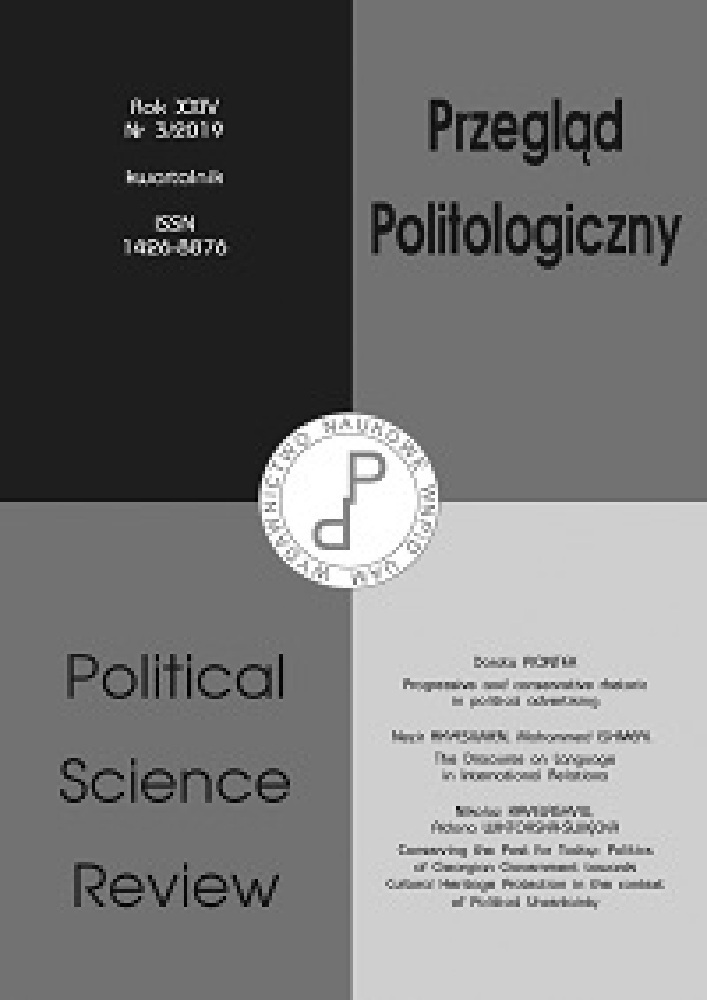Abstract
Little has changed since Stanley Hoffman declared International Relations (IR) an American Social Science and John Hobson highlighted the “lack of value-free and universalist theories of inter-state relations.” Since the 1970s in particular, with the end of the Cold War and developments in Information and Communication Technologies (ICT), the discipline of IR has faced major challenges to its core conceptual and theoretical framework. Despite several systemic changes and the emergence of a new environment in international relations, the field is still heavily reliant on the old, inadequate and/or value-laden concepts of the early twentieth century. Moreover, the discipline has been overloaded by a set of Eurocentric and ethnocentric concepts which lead IR students to question its international character. It is debatable whether this is due to incompetence or misuse of language. This article aims to deconstruct mainstream and hegemonic concepts in IR in a constructive manner. This paper utilizes a qualitative method of discourse analysis to re-examine the relationship between the use of language and context, often taken for granted, which limits the understanding of the concepts used in the discipline of IR to promote innovation and progress in the field.
References
Akyeşilmen N. (2016), Cybersecurity and Human Rights: Need for a Paradigm Shift?, “Cyberpolitik Journal”, vol. 1, no. 1, http://cyberpolitikjournal.org/wp-content/uploads/2017/07/cyberpolitikjournal-Cilt-1.pdf, Feb. 15, 2019.
Al Jazeera (2017), UN official resigns over Israel apartheid report. Israeli–Palestinian Conflict March 2017, www.aljazeera.com/news/2017/03/official-resigns-israel-apartheid-report170317182241142.html, Feb. 15, 2019.
Acharya A. (2014), Global International Relations (IR) and Regional Worlds A New Agenda for International Studies, “International Studies Quarterly” 58.
Ashworth L. M. (2014), A History of International Thought: From the origins of the modern state to academic international relations, Routledge, London.
Barkawi T., Laffey M. (2006), The Post-Colonial Moment in Security Studies, “Review of International Studies” 32 (2).
Barkawi T., Laffey M. (2002), Retrieving the Imperial: Empire and International Relations, “Millennium Journal of International Studies” 31 (1).
Bhaskar R. (1986), Scientific Realism and Human Emancipation, Verso, London.
Brukan S. (1978), The Nation-State: will it keep or weather away?, “International Social Science Journal”, vol. XXX, no. 1.
Crosby R. (2010), The Relativity of Language on Human Thought, http://www.shotoku.ac.jp/data/facilities/library/publication/education-gaikoku49_02.pdf, May 5, 2017.
Dessler D. (1989), What’s at Stake in the Agent-Structure Debate?, “International Organization”, vol. 43, no. 3.
Essayworld.com. (2007), Machiavelli’s “The Prince”: By Any Means Necessary, http://www.essayworld.com/essays/Machiavellis-The-Prince-Any-Means-Necessary/65028, Feb. 19, 2017.
Cassirer E. (1944), An Essay on Man: An Introduction to a Philosophy of Human Culture, Yale University Press, New Haven.
Fairclough N. (1995), Critical Discourse Analysis: The critical study of Language, London–New York.
Gaukroger G. (1986), Explanatory Structures: Concepts of Explanation in Early Physics and Philosophy, Humanities Press, Atlantic Highlands.
Goodey D. (2001), Frantz Fanon: Black Skin, White Mask by Isaac Julien, “Philosophia Africana” 4, no. 2.
Guyer P., Wood A. W. (eds.) (2001), Immanuel Kant, Critique of Pure reason, Cambridge University Press, Cambridge.
Hellmann G. (2011), International Relations as a Field of Study, in: International Encyclopedia of Political Science, eds. B. Badie, D. Berg-Schlosser, L. Morlino, Thousand Sage.
Hobson J. M. (2012), The Eurocentric Conception of World Politics: Western International Theory, 1760–2010, Cambridge University Press, Cambridge.
Hoffmann S. (1977), An American Social Science: International Relations, “Daedalus”, vol. 106, no. 3.
Holsti K. J. (1964), The Concept of Power in the Study of International Relations, “Background”, vol. 7, no. 4 (179–194), http://www.jstor.org/stable/3013644, Feb. 28, 2018.
Hsu F. L. K. (1964), Rethinking the Concept of Primitive, “Current Anthropology”, vol. 5, no. 3.
Jones B. G. (2006), Decolonizing International Relations, Plymouth.
Justus H. (1977), Language and Its Object: Philosophy and Phenomenological Research, “International Phenomenological Society”, vol. 38, no. 2.
Lowe C. (1997), Talking about “tribe”: moving from stereotypes to analysis, Africa Policy Information Center, Washington, D.C., http://www.ciaonet.org/wps/loc01, May 27, 2017.
Luke J. (2014), Terrorism: A Definition and Analysis, E. International Relations Students, http://www.e-ir.info/2014/02/09/terrorism-a-definition-and-analysis/#_ftn5, June 27, 2017.
Mandelbaum M. (1965), The History of Ideas, Intellectual History, and the History of Philosophy, “History and Theory”, vol. 5.
Mitchell C. et. al. (1986), State Terrorism: Issue of Concept and Measurement, in: Government Violence and Repression: An Agenda for Research, eds. M. Stohl, G. A. Lopez, Greenwood Press, New York.
Muni S. D. (1979), The Third World: Concept and Controversy, “Third World Quarterly”, vol. 1(3).
Nkrumah K. (1965), Consciencism – Philosophy and Ideology for Decolonization and development with particular reference to the African Revolution, Monthly Review Press, New York.
Proudfoot D. (2009), Meaning and mind: Wittgenstein’s relevance for the ‘Does Language Shape Thought? Debate’, “New Ideas in Psychology” 27, no. 2.
Reus-Smit C., Snidal D. (2010), The Oxford handbook of international relations, Oxford University Press, Oxford.
Said E. (1978), Orientalism, Routledge & Kegan Paul Ltd., New York.
Seargeant P. (2009), Language Ideology, Language Theory, and the Regulation of Linguistic Behaviour, “Language Sciences” 31.
Skinner Q. (1969), Meaning and Understanding in the History of Ideas, “History and Theory” 8 (1).
Smit N. (2013), The Continued Relevance of the ‘Third World’ Concept. E. International Relations, http://www.e-ir.info/2013/03/26/the-continued-relevance-of-the-third-world-concept/, March 3, 2017.
Thomas C. (1999), Where is the Third World Now?, “Review of International Studies” 25(5).
Tickner A. B., Waever O. (2009), Geocultural Epistemologies. International Relations Scholarship Around the World, Routledge, London–New York.
Tylor E. B. (1871), Primitive Cultures, vol. 1, John Murray, London.
Weber C. (2001), International Relations Theory: A Critical Introduction, Routledge, Taylor & Francis Group, London.
Whorf B. L. (1940), Science and linguistics, “Technology Review” 42.
Wight M. (1966), Why is there no International Theory?, in: Diplomatic Investigations, eds. M. Wight, H. Butterfield, Harvard University Press, Cambridge.

